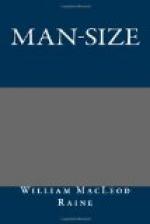The children and the sound of their laughter gave the camp a domestic touch. Some of the brown, half-naked youngsters, their skins glistening in the warm sun, were at work doing odd jobs. Others, too young to fetch and carry, played with a litter of puppies or with a wolf cub that had been caught and tamed.
The whole bustling scene was characteristic of time and place. A score of such outfits, each with its Red River carts and its oxen, its dogs, its women and children, traveled to the plains each spring to hunt the bison. They killed thousands upon thousands of them, for it took several animals to make a sack of pemmican weighing one hundred fifty pounds. The waste was enormous, since only the choicest cuts of meat were used.
Already the buffalo were diminishing in numbers. Vast hordes still roamed the plains. They could be killed by scores and hundreds. But the end was near. It had been several years since Colonel Dodge reported that he had halted his party of railroad builders two days to let a herd of over half a million bison pass. Such a sight was no longer possible. The pressure of the hunters had divided the game into the northern and the southern herds. Within four or five years the slaughter was to be so great that only a few groups of buffalo would be left.
The significance of this extermination lay largely in its application to the Indians. The plains tribes were fed and clothed and armed and housed by means of the buffalo. Even the canoes of the lake Indians were made from buffalo skins. The failure of the supply reduced the natives from warriors to beggars.
McRae came forward to meet the traders, the sleeves of his shirt rolled to the elbows of his muscular brown arms. He stroked a great red beard and nodded gruffly. It was not in his dour honest nature to pretend that he was glad to see them when he was not.
“Well, I’m here,” growled West, interlarding a few oaths as a necessary corollary of his speech. “What’s it all about, McRae? What do you know about the smashing of our barrels?”
“I’ll settle any reasonable damage,” the hunter said.
Bully West frowned. He spread his legs deliberately, folded his arms, and spat tobacco juice upon a clean hide drying in the sun. “Hold yore hawsses a minute. The damage’ll be enough. Don’t you worry about that. But first off, I aim to know who raided our camp. Then I reckon I’ll whop him till he’s wore to a frazzle.”
Under heavy, grizzled brows McRae looked long at him. Both were outstanding figures by reason of personality and physique. One was a constructive force, the other destructive. There was a suggestion of the gorilla in West’s long arms matted with hair, in the muscles of back and shoulders so gnarled and knotted that they gave him almost a deformed appearance. Big and broad though he was, the Scot was the smaller. But power harnessed and controlled expressed itself in every motion of the body. Moreover, the blue eyes that looked straight and hard out of the ruddy face told of coordination between mind and matter.




